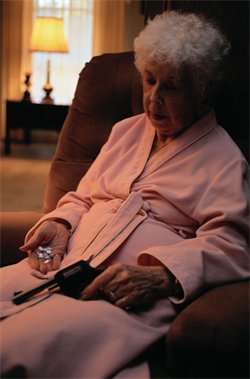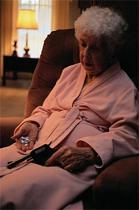Alzheimer's residents often starve to death
I have been visiting my husband for the past 2.5 years in long-term care due to his advanced Alzheimer’s. During this time, I have witnessed many individuals who have likely starved to death. This is not a new problem and according to Schneider and O’Connor (2002) thousands of elderly men and women prematurely die by starvation in nursing centers and hospitals around America. This is not a unique problem in America, it is a world-wide problem, especially now that Alzheimer’s is so prevalent (Mickelburough, 2012). Alzheimer’s residents who are often no longer able to express themselves with words once they enter long-term care are at exceptional risk of death by starvation.
Relatives seldom come to visit, leaving fewer opportunities to notice the skin and bone condition of these elderly vulnerable residents. In the course of a month I spend an average of 100 hours with my husband supervising his day-to-day care and his food/liquid intakes. I have observed residents who are unable to see their food due to binocular vision. They are also unable to retrieve food due to loos of feelings in fingers and struggle to eat on their own. Yet, staff goes on to document 100% intake at mealtime for residents whose food was hardly touched. It is estimated that a third of all nursing home residents cannot eat on their own and close to 100% of Alzheimer’s residents in a memory loss unit cannot eat on their own without staff coaching and assistance (Whocanisue.com, n.d.). Out of 6 tables that are filled with residents that are totally dependent on care, not counting several other residents left in their room alone with a tray of food, only 2 tables have one or two staff members helping with feeding. Without proper coaching or assistance residents at other tables are left on their own, often moving away from the table, confused, while still being very much hungry.
Staff members are often ill prepared and under staffed to feed residents, meeting only the minimum staffing requirements as dictated by the government (Harrinton et al, 2000). Staff receives minimum training and poor supervision. Once a resident has gone 2 or 3 days with little to no nutrition or liquid intake, they weaken and their stomach will shrink, and they become severely dehydrated (National Institute on Aging, 2006). Compounded with a serious condition such as Alzheimer’s, they quickly lose weight and often are hospitalized. Weight loss does not have to be a part of their Alzheimer’s experience until the very end when the brain can no longer send the signal to swallow. It is imperative for staff and family to be mindful not to inadvertently aid vulnerable residents to stop eating and prematurely depart this world.
Since administration and business owners of long-term care facilities have not been responsible in addressing this serious and real problem, it is essential for individual family caregivers to be more attentive and proactive, even unite. The responsibility of protecting and providing for the individuals living with Alzheimer’s is a life time commitment. Individuals living with Alzheimer’s are vulnerable and helpless to effectively express themselves, let alone defend themselves. We, as a society, must protect those who are sick, injured, disabled, and physically or mentally frail from this onslaught of forced starvation and deliberate dehydration (Thunder, 2003).
Administrators and business owners must train their management team to better detect starvation, malnutrition and dehydration (Osbourne, 2012). Both healthcare professionals and families need to team up to assist, supervise, and prevent such needless and early deaths in long-term care and hospitals, especially of individuals who are living with Alzheimer’s and require specialized care. Teaming of the interprofessional health team and families is a major component of the Caregiver Partnership Agreement Program™ at Remembering 4 You.
References:
Harrington, C., Kovner, C., Mezey, M., & Kayser-Jones, J. (2000). Experts recommend minimum nurse staffing standards for nursing facilities in the United States.
Krause, M.R., Palmer, J.L., Bowers, B.J., & Buckwalter, K.C. (2011). Responding to poor-quality care during research in nursing homes. Research in Gerontological Nursing, 4(1), 47-52.
Mickelburough, P. (2012). Hundreds dying in hospitals from hunger and thirst. Herald Sun. Retrieved from http://www.heraldsun.com.au/news/victoria/hundreds-dying-in-hospitals-from-hunger-and-thirst/story-fn7x8me2-1226394963830.
National Institute on Aging. (2006). Promoting successful eating in long-term care: Relationships with residents are key. Retrieved from http://www.nia.nih.gov/alzheimers/features/promoting-successful-eating-long-term-care-relationships-residents-are-key.
Osbourne, H. (2012). NHS: 150 Patients Die from Starvation and Dehydration on Wards. Retrieved from ttp://www.ibtimes.co.uk/articles/392232/20121008/nhs-starving-dehydration-dying-patients- age-uk.htm.
Schneider, A. & O’Connor, P. (2002). Nation’s nursing homes are quietly killing thousands. Retrieved from http://www.ccfj.net/NHSTLseries.html.Thunder, J.M. (2003). Quiet killings in medical facilities: Detection & prevention. Issues in Law & Medicine, 28(3), 211-237.
Thunder , J.M. (2003). Quiet killings in medical facilities: Detection & prevention. Issues in Law & Medicine, 28(3), 211-237.
Whocanisue.com. (n.d.). Find a Nursing Home Attorney that Deals with Dehydration/Malnutrition. Retrieved from http://dehydration-malnutrition.whocanisue.com/.
About the author:
Ethelle G. Lord, former president of the Maine Gerontological Society in the State of Maine, currently is President and Professional Alzheimer’s Coach offering Alzheimer’s coaching and consulting with businesses at Remembering4You.com, and is a professor of Organizational Behavior at several universities. Dr. Lord has a Doctorate of Management in Organizational Leadership from the University of Phoenix. Her 10-year experience as a family caregiver originated with her husband who was diagnosed with Alzheimer’s in Jan. 2003. In that decade she has seen a daily influx of new Alzheimer’s cases. Dr. Lord realized there is an urgent need for a change in perspective with regards to providing individual and institutional care for individuals living with Alzheimer’s. She is married to Maj. Larry S. Potter, USAF retired, and lives in Mapleton, Maine. Dr. Lord is available for presentations, training, and Alzheimer’s coaching/consulting.
Comments
There are 0 comments on this post













